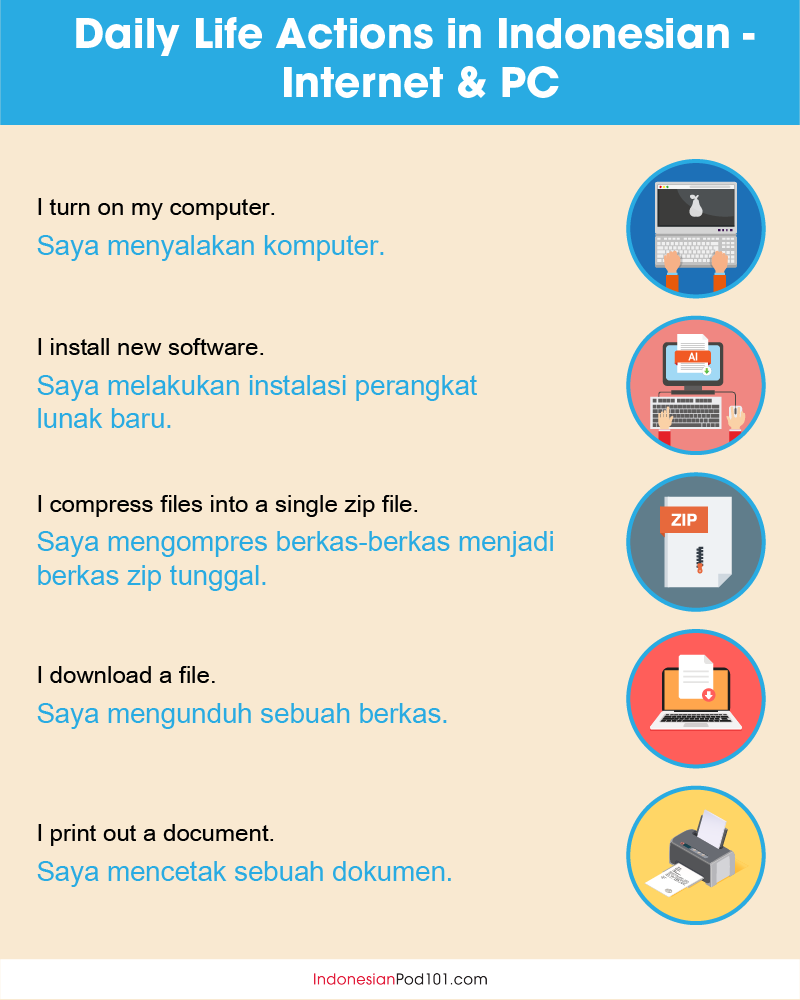
It’s the goal of many language learners when they finally get to travel to a foreign country:
“I’m going to immerse myself in the culture and have tons of local friends. I’ll only speak the local language, and I won’t use English at all!”
Turns out it’s not the easiest goal to achieve.
Once you start interacting directly with native Indonesian speakers, at some point you’re going to incur different expressions that your average dictionary won’t know the meaning of: Indonesian slang.
Enter 21st century SMS slang, from Indonesian love SMS and beyond!
The cool thing is, the more fluent you become with Indonesia internet slang and other texting slang, the more like a native you’ll feel and the more integrated you’ll be.
Later, as you make local friends, you’ll be continuously exposed to Indonesia texting slang. Within a short period of time, you’ll be capable of easily reading and writing it as well as you could formal Indonesian.
In order to save you months of learning this slowly by trial and error, here’s a handy guide to everything you could ever ask about the special language of Indonesian internet slang! From the question, “What does slang mean in Indonesian?” to internet slang words to learn Bahasa Indonesian. Let’s get started!
Table of Contents
- The Way Texting Works in Indonesia
- Haha and Other Casual Written Words
- Pronouns
- 23 Abbreviations You’ve Got to Know
- Conclusion
1. The Way Texting Works in Indonesia
As in a few other Asian countries, it’s not uncommon for people in Indonesia to carry two phones around.
In general, one of them is used for phone calls and one is used for texting and web browsing—which is often one and the same thanks to the prevalence of WhatsApp.
Prepaid SIM cards—called kartu ponsel in Indonesian, as the acronym SIM means “drivers’ license”—are often sold cheaply all over the place with a set quota of texts and data, as well as a time limit.
After a couple of months, your kuota (“data allowance” ) is habis (“empty” ) or the time limit is up and you’ve got to isi pulsa (“top it up” ) or buy a new card if you want to use data or send texts.
All this is to say that even though WhatsApp is incredibly popular, SMS messages are still often used. For instance, customer support hotlines often work via SMS, and when you order delivery or a taxi by app, the driver will often communicate with you by text.
And whether it’s your driver saying “I’m outside” or a pizza parlor sending you a promo for the third time this week, these SMS messages are real Indonesian, with all the slang and shortcuts that implies.
2. Haha and Other Casual Written Words

The first thing you’ve got to know about informal Indonesian texting is that you’re probably not going to catch a lot of it at first.
Someone who’s just texting with you, a foreigner, is likely to use abbreviations sparingly, or at least only use the ones that (in their opinion) are obvious.
You may not agree with their judgment, so let’s have a look at some examples of Indonesian slang in internet chatting or SMS. These are some of the most common Indonesian text slang in internet chatting.
1- Wkwkwk
As Russians have хахахаха and Thais have 55555, wkwkwk is the way Indonesians express the sound of laughter, or LOL.
It actually came from online game communities in the early 2000s, where haha became huehue, and then moved past wewe to land on wkwk (as you can type more efficiently with two hands). Since then, it’s remained one of most popular Indonesian slang words.
Pro tip: This is actually pronounced weka-weka as if you were reading out the letters, so don’t try to pronounce it while skipping the vowels!
2- -in
Normally, you can add the suffix -kan to the end of a word to make it a request or an order.
- Matikan lampu!
“Turn off the light!”
In informal Indonesian, this same particle is replaced with -in.
- Bersihin kamarmu!
“Clean your room!”
3- gedé
This is just one of many Javanese words that enters casual Indonesian speech (in Java, naturally), but it may be the most common. The Javanese word is traditionally spelled gedhe in the Latin alphabet, and it simply means “big.” Therefore, you can read gede as an informal synonym for besar (also meaning “big”).
Remember that the accented é is never written outside of texts for learners.
- Motor terlalu gede!
“The motorbike is too big!”
3. Pronouns
Indonesian has got a lot of pronouns. Some are used in a respectful way, and so they don’t often get abbreviated. As a foreigner, you may often be addressed as Anda (the formal word for “you”) in text communication; this seems almost rude to abbreviate at all.
However, other levels of familiarity often get short texting forms for Indonesian slang in internet or text message settings (including Bahasa Indonesian internet slang).
- sy/km – saya/kamu
This is probably the default pronoun scheme for people that don’t want to sound overly familiar or overly formal. It’s also very common to pair aku and kamu for “I” and “you” respectively, with saku shortened to aq.
- gw/lu – gua/lu
These words most often show up in the texts of Jakarta natives, or people that are adopting Jakarta slang to sound more cosmopolitan. You’ll see them written pretty commonly on Internet blogs and comments, as well as in text messages.
Knowing when to use which pronouns is beyond the scope of this article, but you can actually get pretty far without using any pronouns at all. The context of what you’re saying is usually enough to give you time for the other person to start using pronouns, and then you can just follow their lead.
4. 23 Abbreviations You’ve Got to Know

I searched through hundreds of text messages and internet comments to find the most important and most frequently used abbreviations in real-life Indonesian.
Abbreviations and shortenings are so common because Indonesian can usually be understood without the full set of grammatical prefixes and suffixes. When the meanings get more complex, the affixes come out and the words get longer.
The actual shortening takes place by removing most or all of the vowels. When this happens with longer words like trimaksh, it’s often not too hard to guess what it might mean—in this case, terima kasih or “thank you.”
Here are some more Indonesian words in internet chatting that might take a little guesswork:
1- gpp – gak apa-apa
Gak is here another abbreviation of nggak, meaning the same thing as tidak (“no”). apa-apa means “anything” and so the sentence as a whole means “It’s nothing.”
- Oh begitu, gpp.
“Oh, I see, it’s nothing.”
2- dgn – dengan
Dengan is one of the most common words in Indonesian, and therefore is abbreviated often. (If these words weren’t common enough to be guessable from context, they wouldn’t be abbreviated.)
Interestingly, you can add -mu, -ku, and -nya to dengan to express “with you,” “with me,” “with them/it” respectively, but it’s extremely rare to see the short form take the suffixes.
- Mau ke bioskop dgn Dede?
“Want to go to the movies with Dede?”
3- blm/sdh– belum/sudah
Belum simply means “Not yet.” Use it anytime something expected simply hasn’t yet occurred. Sudah is the opposite, meaning “already.” In a conversation, you don’t need to repeat the verb when you say sudah—the meaning is clear from context.
- A: Kok blm sampai?
B: Sdh.A: “Hey, you haven’t arrived yet?”
B: “Yes I have.”
4- dr – dari
Dari is a very handy preposition meaning “from.”
- Saya berangkat dr pintu depan.
“I’m leaving from the front door.”
5- d – di
You may think this is self-explanatory, and perhaps it is in these examples. But the location particle di, meaning “at,” is easy to miss in a stream of shortened words, when half of your text is single letters.
6- yg – yang
The word yang is very tricky to explain for speakers of many languages, but fortunately not English! It’s a relative pronoun, translating very well to “that,” “which,” and “who” all at once.
- Orang yg belum datang di mana?
“Where is the person who hasn’t arrived yet?”
7- dpn – depan
Depan can mean “front,” like the front of a store, and it can also mean “ahead,” as in “the year ahead.” In fact, that’s how you say “next year” in Indonesian: tahun depan. Remember that when it’s being used as a location, you have to include di (“at”).
- Kotaknya di dpn bukan?
“Is the box out front or not?”
8- dlm – dalam
Another preposition, dalam means “inside.” You can use it pretty much any time you’d say inside in English, and even a bit more often. For instance, it’s normal to say dalam maknanya, literally “inside the meaning,” to describe the content of a speech or argument.
- A: Di mana sepatu?
B: Dlm tas.A: “Where are the shoes?”
B: “In the bag.”
9- krn – karena
Karena is one of those wonderful Indonesian words that translates perfectly into English almost every time. It means “because.”
- Aku terlambat krn macet.
“I was late because of traffic.”
10- tdk – tidak
Indonesian has two ways to say “not.” Bukan is used for saying that something “is not [a noun]” while tidak is used to say that something “is not [an adjective].”
- Sekarang tdk terlalu lambat.
“Now isn’t too late.”
11- utk – untuk
Untuk means “for,” but it’s a little bit harder to translate than that. It can also mean “in order to,” and in fact, that may be the more common usage.
- Saya akan pergi ke Indomaret utk beli tisu.
“I’m going to go to Indomaret to buy tissues.”
12- lsg – langsung
This word is practically indispensable when you want to cut straight to the point. It literally means “immediately,” but thanks to the flexibility of the Indonesian language, it can also mean “right away” or “very soon.”
- Saya akan lsg ke sana.
“I’ll be right there.”
13- lg – lagi
Lagi means “more” or “again” as in, “We’ll meet again,” or “once more.”
- Aku mau pergi ke sana lg!
“I want to go there again!”
14- pny – punya
Punya means “to have,” and occasionally it can also be used in the sense of “belonging to someone.” If you look at the word order alone, you might think it’s backwards, but you just have to think of it as a preposition instead of a verb in that case.
- Ini pny Dilan.
“This is Dilan’s.”
15- hub – hubungan
Here’s an interesting outlier. Most likely, you won’t find much opportunity to use this word in a chat, but hubungan, which means “connection” or “contact” gets used all the time in advertisements—especially the ones that get automatically sent to your phone from your service provider!
- BELI SATU DAPAT DUA: HUB 123-456789
“BUY ONE GET TWO: CONTACT 123-456789”
16- bgt – banget
To round out this list, banget is a wonderfully expressive word and just plain fun to say. It’s an intensifier, like “very,” but is placed after the word it modifies.
It actually comes from Javanese, so if you’re chatting with people from way across the country, they’ll understand but probably won’t use it themselves.
- Makanan Korea itu pedas bgt!
“That Korean food is super spicy!”

Conclusion
Learning the formal version of a language can be challenging enough in its own right. When you add slang into the mix, it can seem impossible to ever reach a high level.
Truly, though, the only thing it takes is time.
The more you read real written Indonesian at all levels of formality—from newspaper articles to online columns to personal blogs to YouTube comments—the easier it will get.
And Indonesians are always very welcoming to foreigners who make an effort to use their language, perhaps even more so if the foreigner in question is jumping into the deep end by parsing sentences with short words and few vowels.
It’s advice for all kinds of language learning, really. Get a lot of experience understanding the language and pay attention to how it’s used, and you’re pretty much guaranteed success. And it won’t be long until you can boast that you’ve learned Bahasa Indonesian internet slang words (and more than prove yourself!).
By the way, let us know in the comments which of these Indonesian text slangs you plan on practicing first! Which ones are most valuable to you?
Author: Yassir Sahnoun is a HubSpot certified content strategist, copywriter and polyglot who works with language learning companies. He helps companies attract sales using content strategy, copywriting, blogging, email marketing & more.














